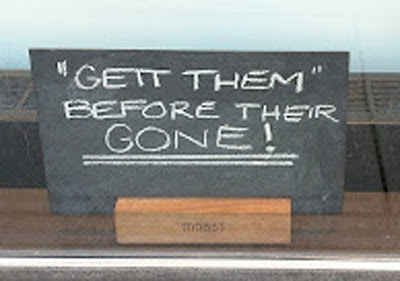Archive
Daily Archives: December 4, 2012
Daily Archives: December 4, 2012
Jess Hearts Books: A New Genre: New Adult – What is it?:
New Adult is a new genre for books that don’t quite fit as either YA or Adult Literature. But mostly from what I understand of it they are a more mature version of the YA books that I love now, about people my age, venturing out into the world for the first time on their own and with more mature themes too. I’m so glad that publishers have realised there is this huge other market out there that need books they can relate to and already there have been some exciting new novels released into this genre that seem to be taking the blogosphere by storm.
 |
| GETT THEM QUOTE MARKS BEFORE THEIR GONE! |
I’ve been thinking about quotation marks.
I can’t remember if I’ve ranted before about how much I hate the convention in some literary books to leave quotation marks off of dialogue. (Probably I have.) Even if the book is in French, I hate it.
Now, I realize this is unreasonable. At first I thought that writers in the literary genre did this just to be annoying but then I realized that they probably did it to be French, and there’s a difference, albeit a subtle one. Americans trying to be French are annoying but not necessarily trying to be annoying. The French themselves are not annoying. (I have lived in France, and the point of this post is not French-bashing.) French literature has different punctuation conventions than English, and although I don’t like them, and I think our English quotation marks are vastly superior, I can’t blame the French for their silly ways. If I didn’t want to be exposed to the lack of decent quote marks in French books, I should have been a good American and never learned to read another language.
When I pick up a book in English, however, I don’t think it’s unreasonable to expect it to be punctuated properly.
 |
|||
| If this is honestly a mystery to you, review your basic rules here. |
Granted, punctuation rules change. I use “quote marks” along with the “quotation marks” and that’s probably sloppy. I’m not sure if putting a word in quotation marks always indicated sarcasm in English. (I imagine that “air quotes” are even more recent…wait, should air quotes have quote marks?) Also, it’s been clear from the ongoing struggle to teach the hand written sign posters of the world that apostrophes are a lost cause, so why should we expect any better fate for quote marks? Either that, or people who write signs are constantly given to sarcasm.
 |
| And by “police,” we mean Mrs. Betty across the street. She will “whoop” you. |
However, when I pick up a book by a “good” author, must I really pry my way through endless pages of quote-free dialogue:
I’m supposed to go to the hospital now, said Lisa, taking my hand.
Ann said: I’m supposed to go back to school and get picked up for ballet class.
Want to switch? Lisa asked, as we approached the park.
Sure, said Ann. Okay.
Lisa’s face lit up. Really? she said. Really?
Ann burst out laughing, total revenge exacted for all the pirate suffering she’d endured in the last hour.
No way, she said. I was only kidding.
It’s not that I can’t follow who’s saying what, but I feel less immersed in the reality of the story. This a magical realist story by Aimee Bender, An Invisible Sign of My Own, so perhaps that was her intent, but if so, I think it works against the rest of the story. The same is true for The Particular Sadness of Lemon Cake.
I don’t deny that are there are stories where this technique fits the whole zeitgeist of the book. In The Road, I think it fits perfectly:
He watched the boy and he looked out through the trees toward the road. This was not a safe place. They could be seen now from the road now it was day. The boy turned in the blankets. Then he opened his eyes. Hi, Papa, he said.
I’m right here.
I know.
It works for Cormac McCarthy because the narrator of The Road is already so distant and deadened that the lack of quotation marks fits the rest of his narrative voice. Quotation marks? Hell, the guy can’t even name his son … by his name or as “son.” He’s just “the boy.” Could a guy like that bother with quotation marks? It makes the whole story difficult, like reading underwater, gasping for breath, but that fits his post-apocalyptic vision. (Perhaps it’s also what Aimee Bender was going for, since her characters react toward ordinary events as apocalypses.)
However, I suspect that a lot of literary writers eschew quotation marks because they’ve seen other writers in their genre do it, and they take it for a convention.
This did get me wondering. If the lack of quotation marks serves to dehumanize characters, an abundance of quotation marks could anthropomorphize a landscape.
The road dared me, “You don’t have the guts.” My car begged, “Let me at ‘im, boss.” I slung myself into the seat, which groaned, “You could stand to lose a few.”
Hm. Okay, it could work, but it could also get tired very quickly. It would be something you’d have to establish early on in the book as a quirk of the voice, yet resist the temptation to overuse.
Or we could take our inspiration from grammar-free sign writers and make everything sound really sarcastic:
An “hour” later they were “on the road.” He pushed the “cart” and both he and “the boy” carried knapsacks. In the knapsacks were “essential” things. In case they had to abandon the “cart” and make “run for it.”
Yeah, that “works.”